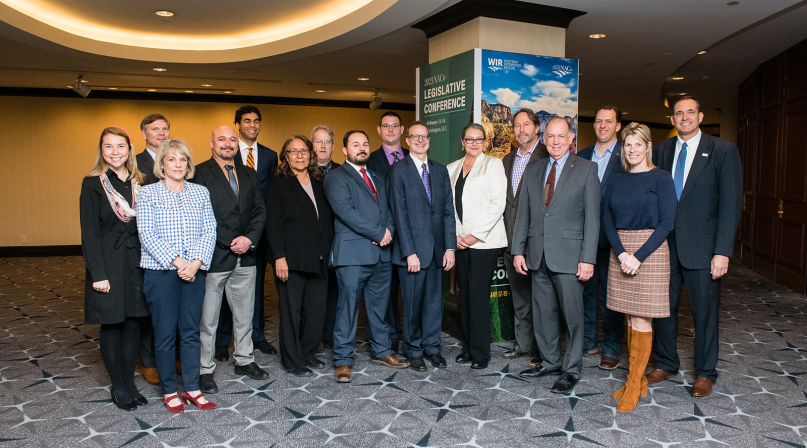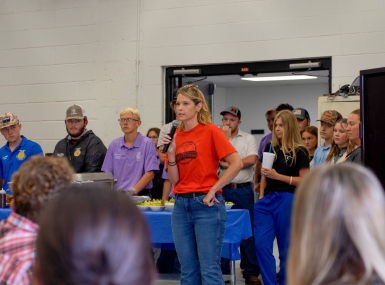Participants announced to receive specialized technical assistance through NACo’s Building Resilient Economies in Coal Communities Initiative
Upcoming Events
Related News

The National Association of Counties (NACo) proudly announces the final selection of communities and local leaders to participate in the Building Resilient Economies in Coal Communities (BRECC) initiative, a Community of Practice supported by the U.S. Economic Development Administration.
“The U.S. Economic Development Administration is committed to supporting coal communities currently facing and experiencing transition,” said Assistant Secretary of Commerce for Economic Development Alejandra Y. Castillo. “Through the Building Resilient Economies in Coal Communities initiative, we’re delighted to recognize and support the 20 local leaders and eight community teams who were selected to participate in the Commitment Coalition and Action Challenge. They represent the innovative, entrepreneurial leadership that is needed to help coal communities across America build and access new opportunities for growth in the years ahead.”
Selectees span across 13 states and will receive technical assistance and peer learning support to strengthen and grow opportunities in local economies that have been shaped by coal industries. BRECC’s programming will build local capacity to pursue a wide range of economic revitalization strategies, including workforce retention and development, infrastructure and alternative energy, placemaking and outdoor recreation, entrepreneurial ecosystems and business development and sustainability and funding planning. BRECC’s Action Challenge will support community teams to create an economic diversification strategy, and the Commitment Coalition will share best practices among community leaders through site visits and peer exchanges.
“Coal communities play a vital role in our nation’s economic prosperity” said Matt Chase, NACo’s CEO and executive director. “We are committed to helping coal communities increase the resilience and strength of their economies by leveraging NACo’s close relationships with local and federal stakeholders.”
BRECC’s Action Challenge will connect eight community teams with economic development experts from NACo’s BRECC partners the West Virginia Community Development Hub, EntreWorks Consulting and Community Builders. For one year, the selected teams will receive one-on-one coaching to develop a locally-driven economic diversification strategy that empowers participating communities to identify and advance projects for economic revitalization.
NACo is delighted to announce the following community teams participating in BRECC’s Action Challenge:Cumberland Plateau Planning District Commission, Va.: In southwestern Virginia, the Cumberland Plateau Planning District Commission is a regional Economic Development District serving the counties of Buchanan, Dickenson, Russell and Tazewell. With a regional approach, this team seeks to grow economic resilience through entrepreneurship and business development strategies. City of Richwood, Nicolas County, W.Va.: In central West Virginia, the City of Richwood is experiencing population loss tied to the decline of the local coal industry. Building on natural assets, this team looks to expand its outdoor recreation economy with a special focus on a local trail network. Counties of Apache, Coconino and Navajo, Ariz.: In Northern Arizona, the counties of Apache, Coconino and Navajo face the closure and decommissioning of several coal-fired power plants. Collaborating across county borders, this team will coordinate planning to create a complimentary, shared strategy for economic diversification. Floyd County, Ky.: In eastern Kentucky, Floyd County has seen a decline in coal production over the past three decades and recent flooding has exacerbated economic hardships. Led by a newly created long-term recovery group, this team will pursue opportunities in outdoor and cultural tourism as well as residential attraction. Pike County, Ind.: In southwestern Indiana, Pike County’s employment and tax base are closely tied to a coal-fired power plant slated to be decommissioned. This team will create a local strategy around business attraction and workforce retention goals. Perry County, Ohio: Perry County is facing the impact of its last two mines closing. This team will advance planning for placemaking economic development strategies. Northwest Colorado Development Council, Colo.: In Northwest Colorado, the Northwest Colorado Development Council serves the counties of Rio Blanco, Moffat and Routt, which face the impending closure of two coal-fired power plants. In partnership with a regional community college, this team will expand on strategies for advancing clean energy initiatives. San Juan County, N.M.: In northwest New Mexico, San Juan County is experiencing the closure of one coal-fired power plant and faces the impending closure of another. In partnership with Four Corners Economic Development, this team will advance strategies for workforce redevelopment and business expansion. |
BRECC’s Commitment Coalition will build a peer network of 20 coal community leaders, who will deepen their knowledge of economic resilience through national subject matter experts as well as their counterparts’ community-based experiences. Selectees represent local, regional and state government entities as well as the nonprofit and private sectors. Over two years, the selected leaders will attend in-person site convenings and virtual workshops and share their experiences through BRECC’s national storytelling platform.
NACo IS DELIGHTED TO ANNOUNCE THE FOLLOWING COMMITMENT COALITION MEMBERS AND THEIR CORRESPONDING COAL COMMUNITY COUNTIES AND STATES:
|
All selected Action Challenge communities and Commitment Coalition members will also participate in BRECC’s National Network, which features economic revitalization and diversification resources and a bi-monthly virtual learning series. The BRECC National Network is open to all coal community stakeholders from across the county and no application is required. Learn more about how to join BRECC activities at www.naco.org/BRECC.
BRECC is operated by the National Association of Counties using federal funds under award ED22HDQ3070080 from the Economic Development Administration, U.S. Department of Commerce. The statements, findings, conclusions, and recommendations are those of the author(s) and do not necessarily reflect the views of the Economic Development Administration or the U.S. Department of Commerce.
Related News

National Association of Counties Reinforces Intergovernmental Partnership in Response to State of the Union Address
The National Association of Counties (NACo) responded to President Trump’s State of the Union address with a statement from Executive Director Matthew Chase.

Inland port offers opportunity for Hertford County, N.C.
Hertford County, N.C. doesn’t have a lighthouse, but that hasn’t stopped its economic future from shining thanks to what became known as Project Green Lantern.

Chamber of commerce program helps keep workers on the job
Audrain County, Mo.'s Workforce Resource Assistance Program has helped employers keep staff in place, reducing turnover and promoting stability.
Featured Initiative
Building Resilient Economies in Coal Communities
The Building Resilient Economies in Coal Communities initiative connected coal communities, supported local leaders and built capacity in under-resourced communities to advance new approaches and projects for economic diversification.
